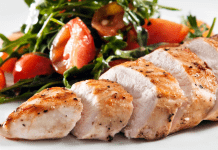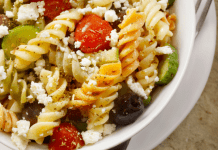Recently, I learned about food positivity and began implementing some ideas into our household. I realized the importance of changing the way we talk and think about food. I want my kids to have a healthy relationship with food. And I don’t want them to worry about their weight or body image or deprive themselves in order to look a certain way.
Generational Eating and Diet Habits
I didn’t realize how unhealthy my relationship with food was until I had kids. As many of us probably did, I grew up with the notion that I had to finish the food in front of me. Dessert was also an after meal privilege.
After I had my son, I was “highly encouraged” to lose my baby weight within the first couple of weeks. I was told that if I didn’t lose the baby weight, I’d look like a “frumpy” mom who let herself go. This advice came from my mother. She comes from a different time with different expectations and points of view. I don’t blame my mother, but I blame the generations that came before her that encouraged these unhealthy ideals. Your success as a person was determined by your weight.
The Natural Way Was the ONLY Way
When we had our first son, I was as “crunchy” as could be. I breastfed my son until a little after his first birthday. I only allowed him to eat organic food. And I practiced baby-led weaning and was a strict vegetarian.
The first time my niece offered my son a PROCESSED chicken nugget, I nearly had a heart attack. My son had veggies in every single meal, and I was strict on his sugar intake. It was easy for me to do this with my son, but I wasn’t practicing what I preached. I would tell myself that I wanted him to be healthier but I was a lost cause.
» » » » » » RELATED READ: The Ultimate Costco Snack List for Food Allergy Moms « « « « « «
After our family doubled in a short amount of time, I learned that I couldn’t sustain the strict diets that I had implemented. For a while, we were a strictly vegetarian household. I only let the kids eat at school when there were vegetarian options offered. But I couldn’t ignore the fact that my kids LOVED chicken and steak. No matter how much I wanted them to love tofu and seitan, they just hated fake meat. No amount of seasoning on tofu would make it taste like chicken or meat! I still enforced it though because I thought that was the healthiest thing to do.
 Learning to Let Go
Learning to Let Go
Very quickly, I learned that I was creating an unreasonable and unhealthy relationship with food. I can only control so much of my child’s environment. I was putting unrealistic and strict standards on my children. And it was especially unrealistic when I was off snacking on the side and excluding veggies from my meals.
I became the only vegetarian in our house, and I was finally okay with that. Before, I would enforce my views and side eye my kids whenever they’d eat meat. Now I’ve learned that they need to experience and try new foods. They need to come to their own conclusion and determine what they like and don’t like.
Fear of Food
The biggest reason I turned to food positivity was because my oldest son started developing an unhealthy fear of developing diabetes. He was terrified of sugar and looked at sugar content in all of the food he ate. Although we weren’t directly telling our kids they would get sick if they ate too much sugar, we did limit and monitor their sugar intake quite a bit . . . to the point where they were starting to notice and develop fears.
I used to use words like “junk food” and call certain foods “bad.” Desserts were dangled like prizes if they ate their veggies. I didn’t realize that this was leading my children towards an unhealthy relationship with food! Unknowingly, I was giving desserts all the power and teaching my kids that they needed to earn sugary treats.
Unlearning “Healthy Food” Habits
It wasn’t until I started seeing posts on TikTok from food nutritionists that I realized how wrong my approach to food was! My approach towards food with my children was leading them towards the wrong path.
My “aha moment” came when I read an excerpt of my daughter’s book Guts by Raina Telgemeier. I read the part where she talked about not being afraid of food and taking the control back. Suddenly, I realized I was teaching my kids to FEAR food. I thought I was teaching them healthy eating habits. But I was actually teaching them to fear overeating, fear their sugar intake, fear what their body would look like, and worry about future ailments.
I’ve since learned to have an open dialogue when it comes to food. I should not be so closed-minded on what foods they can and cannot have. After all, I don’t want to raise kids who feel so deprived from eating certain foods that they overindulge once they move out! Dessert can be eaten with meals to give kids the choice. Certain foods do not have to be eaten first!
Changing the Way We Talk About Food
I started asking my kids when they wanted me to pack them lunch and when they wanted to eat at school. I invited them to try new foods or snacks and don’t demonize their choices. It is important to talk about foods in terms of the amount of energy they provide to the body rather than how healthy they are.
I asked my husband to stop saying words like “diet” and phrases like “I shouldn’t have eaten so much.” Instead we say things like, “We need to eat food that will give us more energy.” Or, “My body is full now. I think I will stop eating.” Even though it PAINS me because I hate to waste food, I allow them to eat until they say they are full. They can offer to their leftovers to their siblings or throw it away.
Continuing To Grow
In doing these small things, I feel like I’m taking the power away from food and giving my children the power to make healthy choices. The kids now ask more questions about what foods give more energy.
Although I am still learning about healthy eating habits, I’m so happy to see a positive change in the kid’s eating habits. A great resource that I continue to use as a guide is Kids Eat In Color, and I also follow her on Instagram.
The fear of foods has gone, and the enjoyment of food has returned!
The opinions expressed in this post are those of the author. They do not necessarily reflect the official policy or position of El Paso Mom, its executive team, other contributors to the site, its sponsors or partners, or any organizations the aforementioned might be affiliated with.









